John J. Montgomery High’s football history does not require an encyclopedic tome.
A few pages would be more than enough.
Most of those pages would be devoted to the 1982 season. Coach John DeVore’s Aztecs posted a 9-2 record, the best in their history and one of the few winning seasons since the Otay Mesa school opened in 1970.
Poets and rhapsodic observers might be moved to exclaim that Montgomery’s success under DeVore not only was rare, it was kismet.
The DeVore name resonates in the South Bay region. John followed a path similar to that of Chet DeVore, his legendary father, who is remembered for football success at Chula Vista and for a long and respected tenure in administration.
When he retired in 2010, John DeVore had been principal at Sweetwater Union district schools Southwest and Olympian and had posted the best record ever for a Montgomery coach.
DeVore was the third head coach in Montgomery history. His won-loss record of 49-35-5 from 1976-83 has not been approached. Julio Alcala’s 35-47-1 is next.
MONTY’S YEAR?
Big enough, fast enough, and fairly deep, Montgomery was 6-0 in nonleague games and went to 9-0 overall and 3-0 in Mesa League play with a dramatic, 20-17 victory over visiting Castle Park.
Behind for the first time all year, the Aztecs had the ball on the 16-yard line of Castle Park and trailed, 17-13. Quarterback Bernardo Vasquez scrambled and hit Joe Clifton for the winning score with a minute left in the game.
Clifton was the fourth or fifth receiver on Vasquez’ progression list. Star wideout Art Ramsey was roughed up out of bounds at the end of the first quarter, then was ejected for retaliating.
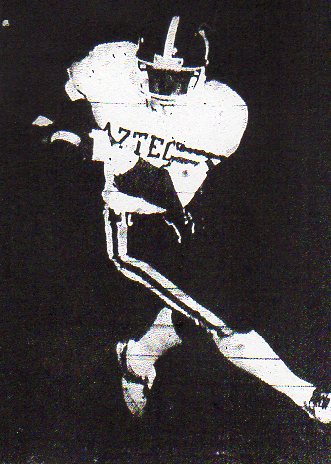
SWEETWATER PREVAILED
Victory over the traditionally difficult Trojans was a formidable achievement, but not enough. Old nemesis Sweetwater won the league championship the following week by defeating the Aztecs, 20-6.
Montgomery didn’t give in to James Primus, the County’s leading rusher, who scored 6 touchdowns and rushed for 305 yards in his previous game.
The bigger Red Devils came at their lighter opponents with repeated student body power sweeps, but Primus had to work, rushing 29 times for a hard-earned 115 yards and one touchdown as Sweetwater broke a 6-6 tie in the fourth quarter.
Montgomery’s season ended when Morse, another rugged squad, took a 13-12 decision in the first round of the San Diego Section AAA playoffs.
Misfortune struck the Aztecs on the second half kickoff when Darryl Rosette ran 90 yards for a touchdown and a 13-6 Morse lead after Montgomery had outplayed the Tigers throughout the first half.
PRACTICE NOT PERFECT
The Aztecs practiced kicking away from the dangerous Rosette all week, and then unintentionally kicked to him.
Monty struck back with a 14-play, 69-yard touchdown drive but a two-point conversion attempt was unsuccessful and a bad snap from center aborted a late field goal attempt that could have the won the game.
“Most teams didn’t throw,” said DeVore, who played quarterback in high school at Hilltop. “We had a good quarterback, a good offensive line and really strong wideouts.
“Beating Castle Park before a sold out stadium was a real high point. I think the difference between us and Sweetwater is that Sweetwater had been in that type of game and we hadn’t.”
JOHN J. WHO?
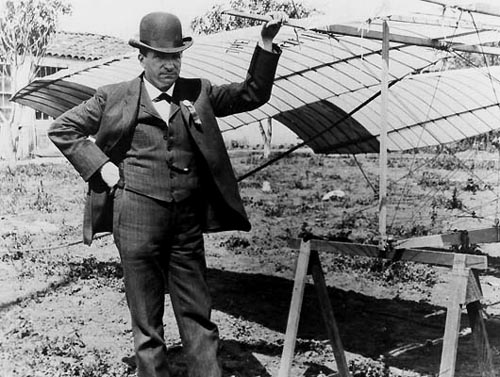
Montgomery High is named after a Northern California aviator who became airborne two decades before the Wright brothers. Montgomery piloted a glider from a hill on Otay Mesa in 1883, near where the school campus sits today.
As there were no independent observers of Montgomery’s flight some aeronautical historians doubted the feat. It was not recognized until 1894.
According to historian Donald Harrison, aviation pioneers conducted their tests in great secrecy in order to be the first to bring their inventions to the patent office, so only relatives claimed to be witnesses to Montgomery’s 600-foot flight in a flying machine with curved wings.
Montgomery was killed in 1911 in a crash of another glider and is buried near San Francisco.
Several schools here and the Montgomery airport on San Diego’s Kearny Mesa honor his name. The wing of a World War II era plane stands upright on the hill in Otay Mesa, where John J. was said to have taken flight.
WRITER CALLS TIME
Visiting San Pasqual and Torrey Pines were earnestly going at it early in the season’s opening game. A late arrival was The San Diego Union reporter Steve Brand, who looked at the scoreboard and noted that 12 minutes, 30 seconds remained in the first quarter.
As the Evening Tribune’s Bud Maloney explained, “In the tenor of ‘What’s going on here?'” Brand quizzed colleagues on the field, who hadn’t noticed.
Brand continued to pose the question as he watched the teams play a 15-minute quarter, okay for college and pro games but 3 minutes more than for high school.
The scoreboard clock lined up at 15:00 when the second quarter started.
Brand couldn’t stand it any longer.
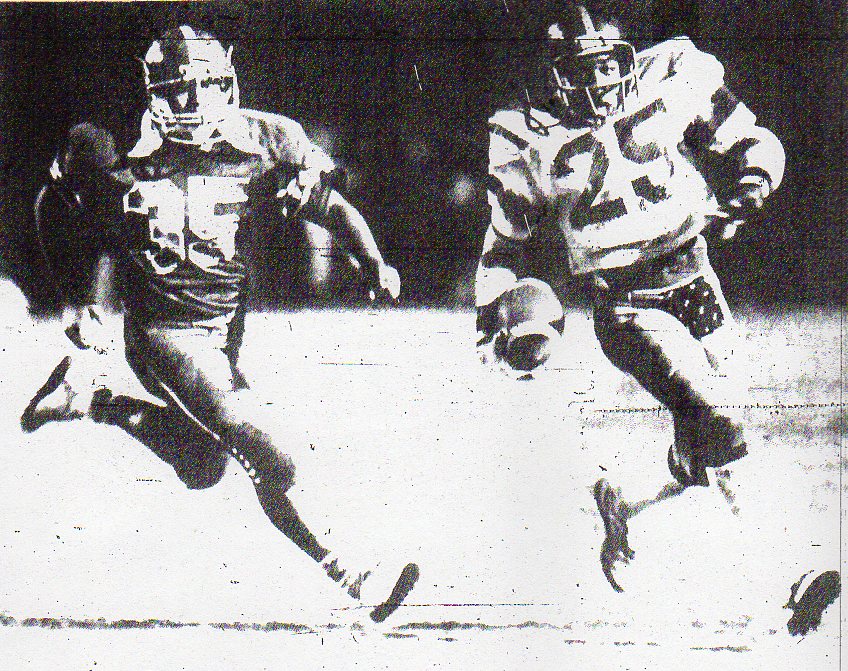
COACH SURPRISED
The veteran scribe made his way into into the Torrey Pines bench area, seeking out Falcons coach Ed Burke.
Brand, voice rising: “Are the high schools playing fifteen-minute quarters now?”
Burke, puzzled by Brand’s presence and by what the coach considered a peculiar question: “Ah, no, we still play twelve minutes.” Brand: “Well, you’ve just played a fifteen-minute quarter and it looks like you’re going to play another.”
Burke blinked as he looked at the scoreboard clock, then hailed the closest official and pointed to the scoreboard. Arm-waving and more pointing continued as other officials and San Pasqual coach Bob Woodhouse joined the conversation.
IRRIGATION SYSTEM PART OF PLAY
The game timekeeper was summoned and an official conference was called. There was discussion about a nine-minute second quarter but agreement was finally reached on the regulation 12 minutes for the last three quarters.
As if on cue, water sprinklers came on just before halftime, adding to a comedic scene.
Fortunately the teams were at the other end of the field and a valve was shut off before the contest had to be stopped.
San Pasqual won the 51-minute game, 21-16. One of the longest regular-season, non-overtime high school contest in San Diego history. Quarters were 15 minutes for many years decades earlier.
NEW CENTURIONS AND OTHERS
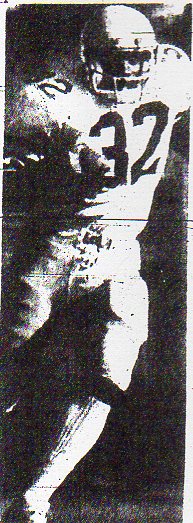
University City High, which opened in 1981, played a varsity schedule for the first time. Mission Bay High played games on a home field for the first time since the school opened in 1953. New lights were in at Fallbrook and “not quite” in at Southwest.
Sixty-four light banks, at $315 each, were needed to illuminate the field at Fallbrook. Twenty-thousand dollars was raised as the money was collected in shares of $315 each.
JUST FINE, THANK YOU!
The question was posed to Helix coach Jim Arnaiz: “What’s life like without Jim Plum, Allan Durden, Karl Dorrell, and Dan Hammerschmidt?”
Helix answered with an opening, 30-6 win over Patrick Henry and rolled to a 12-1 record, and topped Mt. Carmel, 10-6, in the 3-A championship at Southwestern College.
The Highlanders weren’t rebuilding but reloading.
Arnaiz’ big four led Helix to a combined 29-4-1 record in the last three seasons, but Scott Webb, who replaced Plum at quarterback; running back Steve Webster, receiver Tony Necoechea, and defender Chuck Cecil, among others, stepped up.
Cecil, also a dangerous kick returner, transferred in the previous winter from the Central Section’s Hanford in the San Joaquin Valley. Cecil’s hard-hitting reputation followed him to the University of Arizona and into the NFL, where he played and coached.
SCOTS’ SCOTT
Scott Webb’s point after and field goal were the difference as the Highlanders won their 51st game (against 7 losses and a tie) in the last five seasons, defeating Mt. Carmel, in San Diego Stadium.
Webb stepped in at quarterback this season after sitting behind Jim Plum since Scott was a freshman and directed the Scots to a dozen wins, many of which positioned by his solid leadership and by his kicking leg.
Webb scored 3 touchdowns, 41 points after, and 12 field goals for 95 points, fourth in the San Diego Section. He set a Section record with 5 field goals (plus two extra points for a record 17) in a 29-0 victory over Granite Hills. Webb’s career totals included 120 points after and 29 field goals.
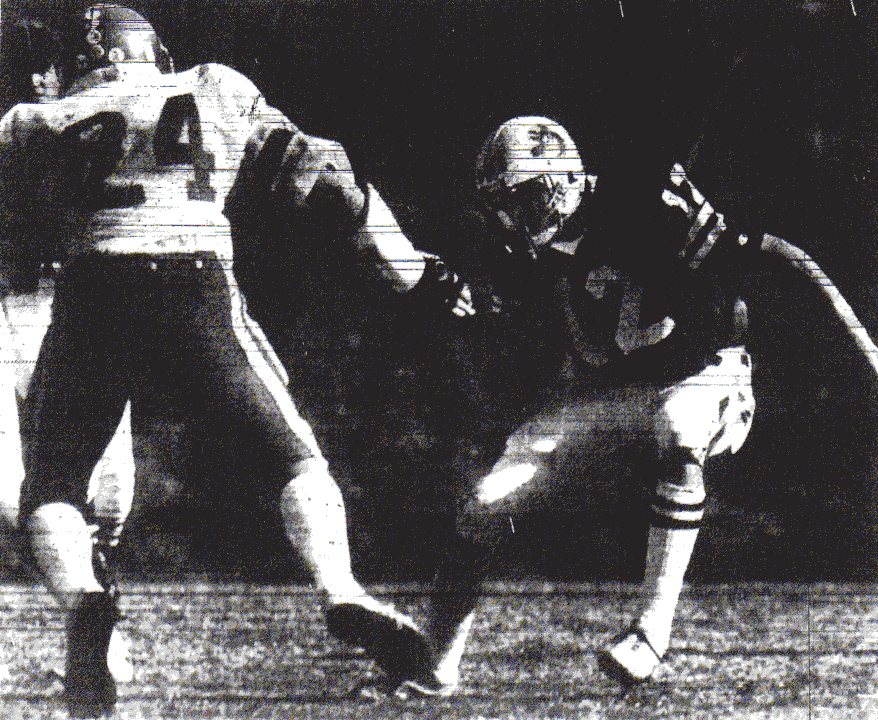
NOT DECLAWED DESPITE RECORD
Coach Dick Haines’s Vista Panthers were only 4-6 but they scored one of the biggest victories in program history, knocking off the state’s third-ranked team, Huntington Beach Edison, 6-0, in Week 2.
A crowd of 8,000 at Vista watched as Scott Black kicked 47- and 43-yard field goals in a span of 49 seconds in the second quarter to end the Chargers’ 36-game, regular-season winning streak.
Five of Vista’s six losses were to teams with a combined record of only 24-29-2, but the Panthers also defeated Morse, a 8-4 playoff semifinalist, 23-14. They lost to 2-A champion El Camino,12-0, and 3-A finalist Mt. Carmel, 27-10.
FLAT FINALE
When regulation play ended and Point Loma and El Camino were tied, 6-6, in the 2-A championship, the 6,000 fans in attendance at Mt. Carmel High expected an overtime session and let their displeasure be known when CIF commissioner Kendall (Spider) Webb declared the teams co-champions.
Playoff rounds through the semifinals have overtimes because one team has to advance. Fans were expecting a tie-breaker, although no provision had been made for one. It was the second championship tie in the 23 seasons of the CIF San Diego Section. Escondido and San Diego deadlocked at 21 in 1969.
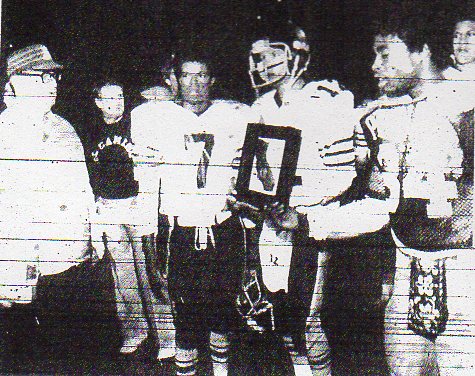
WIN ONE FOR THE BENNIE
His coaching career at Point Loma was in season number 28 and Bennie Edens said he’d never witnessed anything like the Pointers’ big Western League win over Clairemont.
“I told the kids at halftime that whether we won or lost I was prouder of them than any team I’ve ever coached,” said the Bennie. “I’ve never seen anything like it, being hit like we were and then coming back to win.”
Clairemont scored on the first two plays it possessed the ball, Chris Hardy running 71 and 49 yards for touchdowns. The Pointers fought back, going 58, 76, and 58 yards for a 19-13 halftime lead. The lead switched twice more before Clairemont etched a tie at 27 with eight minutes left in the game.
After Eric Allen ran 67 yards to the Chieftains’ 9, Point Loma’s David Rod kicked a 25-yard field goal. Rod’s kick gave the Pointers a final, 30-27 advantage as the teams, apparently spent, did not score in the final 7:06.
CAVERS LEGEND FEELS PAIN
One week after the crushing loss to Point Loma, Clairemont took out its disappointment on San Diego, 76-6, prompting a call from writer Steve Brand to retired Cavers coach Duane Maley.
The Cavers were 97-19-2 under Maley from 1948-59 but their program had not been the same since.
“It’s incredible that it could happen to a school with such a rich history,” said Maley. “I believe the type of athlete attending Sn Diego High has changed. It’s sad the program has slipped to that level.”
Maley did not point a finger. “I know (Clairemont coach) Steve Miner and he purposely wouldn’t run the score up on anyone. He’s a fine young man.”
The widest margin of victory for a Maley-coached team at was in a 59-0 victory over La Jolla in 1958.
“It’s foreign for a coach to tell his players not to play hard, to tell a fourth stringer to ease up,” said Maley. “We tried to let everyone play when the game started to get out hand, and we had more players then.”
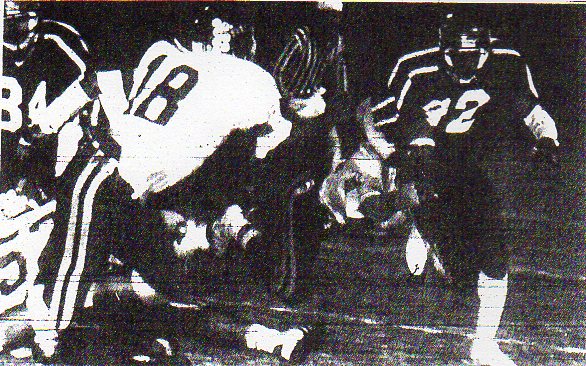
POINTERS, SUNDEVILS, AND NFL
Probably 300 to 400 San Diego-area preps have landed on active rosters in the NFL or other pro football leagues, beginning with San Diego’s Brick Muller with the 1926 Los Angeles Buccaneers and Russ Saunders with the Green Bay Packers in 1931.
Few have surpassed the career of Eric Allen, a standout on Bennie Edens’ 11-0-1 Pointers and a second-round draft choice out of Arizona State, the 30th player selected in the 1988 NFL draft by Philadelphia.
Allen played 14 seasons for three teams, is in the all-time top 15 with 54 pass interceptions, with eight touchdown returns; earned 6 Pro Bowl berths, and played in 214 of a possible 217 games.
TRUE GRID
The 3-A championship was played in the afternoon at Southwestern College…high rent costs forced the 3-A and 2-A games out of San Diego Jack Murphy…El Camino coach Herb Meyer called his team the “Dirty Thirty”…the Wildcats never dressed out more than 30 players and sometimes less…a week after resigning at the end of the season to spend more time with his family, Patrick Henry coach Dale Twombley was replaced by longtime assistant Walt Baranski…Baranski was a Hoover graduate, class of 1957; Twombley was Hoover, ’63…Edens on the 2-A tie: “I would have loved to win and of course Herb feels the same way, but perhaps a tie is fitting; we had a great game between two great teams”…Meyer: “A tie is what we deserved, as bad as we played”…Edens was the Section’s senior coach, followed by Meyer (24 seasons), La Jolla’s Gene Edwards (23), and Vista’s Dick Haines (13)…Point Loma went undefeated in the regular season for the first time since 1939…Ronnie Lewis was successful on Morse’s first field goal attempt since 1977, a 26-yarder in the 10-6 win over Madison…Monte Vista standout Herb Duncan showed some of the moves that reminded Chargers fans of his dad, the great punt returner and defensive back Leslie (Speedy) Duncan…Morse and Serra played in the second annual Friendship Bowl and were the only city schools playing 10 regular-season games…Bennie Edens of Point Loma and John Shacklett of Morse started the series in 1981…Morse topped Serra, 20-7….
..
